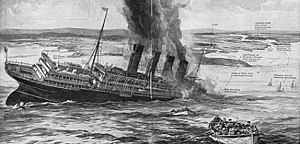Why Did a German U-Boat Sink the Passenger Ship Lusitania?
The sinking of the RMS Lusitania by a German U-boat during World War I is a historic event that has been the subject of much analysis and debate. Understanding the reasons behind this tragic incident requires a closer look at the historical context, strategic motives, and immediate circumstances surrounding the attack.
Historical Context
The RMS Lusitania was a British ocean liner owned by the Cunard Line, famous for its speed and luxury. Launched in 1906, it was one of the largest and fastest ships of its time. During World War I, the waters around the British Isles became a dangerous zone due to the intense naval warfare between the Allies and the Central Powers.
German Naval Strategy
Germany's naval strategy in World War I heavily relied on unrestricted submarine warfare. This tactic involved using U-boats to sink enemy and neutral ships without warning, aiming to cut off supplies to Britain and force it into submission. By 1915, Germany declared the waters around the British Isles a war zone, warning that any ship, including passenger liners, could be targeted.

why did a german u-boat sank the passenger ship lusitania
The Fateful Voyage
The Lusitania departed from New York on May 1, 1915, heading to Liverpool. Despite warnings from the German Embassy in the United States about the dangers of sailing through the declared war zone, the ship carried nearly 2,000 passengers and crew. Unbeknownst to many, the Lusitania was also carrying munitions and war supplies destined for Britain, making it a legitimate target under the rules of war at that time.
The Attack
On May 7, 1915, the German U-boat U-20, commanded by Captain Walther Schwieger, spotted the Lusitania off the coast of Ireland. Believing the ship to be carrying contraband supplies and responding to the strategic directives of unrestricted submarine warfare, Schwieger ordered a torpedo attack. The Lusitania was struck on the starboard side, leading to a massive explosion and the ship's rapid sinking within 18 minutes.
Immediate Aftermath
The attack resulted in the loss of 1,198 lives, including 128 Americans, which caused international outrage and significantly shifted public opinion against Germany, particularly in the United States. The incident was used as a powerful propaganda tool by the Allies, emphasizing the brutality of German naval warfare.

why did a german u-boat sank the passenger ship lusitania
Long-term Consequences
The sinking of the Lusitania had profound implications for the course of World War I. It played a crucial role in swaying American public opinion, contributing to the United States' decision to enter the war in 1917. This shift provided the Allies with additional resources and manpower, ultimately influencing the war's outcome.
Controversies and Debates
Several controversies surround the Lusitania's sinking. Critics argue whether the ship should have been warned more explicitly or whether it was fair to label it a legitimate target due to its munitions cargo. Additionally, debates persist about whether the British government used the Lusitania's sinking as a deliberate ploy to provoke American involvement in the war.
Conclusion
The sinking of the RMS Lusitania by a German U-boat was a pivotal moment in World War I, driven by Germany's strategy of unrestricted submarine warfare and the broader context of the naval conflict. While the attack achieved its immediate tactical objective, it also had far-reaching consequences, shaping the war's dynamics and the eventual involvement of the United States.
Understanding the reasons behind the Lusitania's sinking provides insight into the complexities of wartime strategies and the tragic human cost of naval warfare.